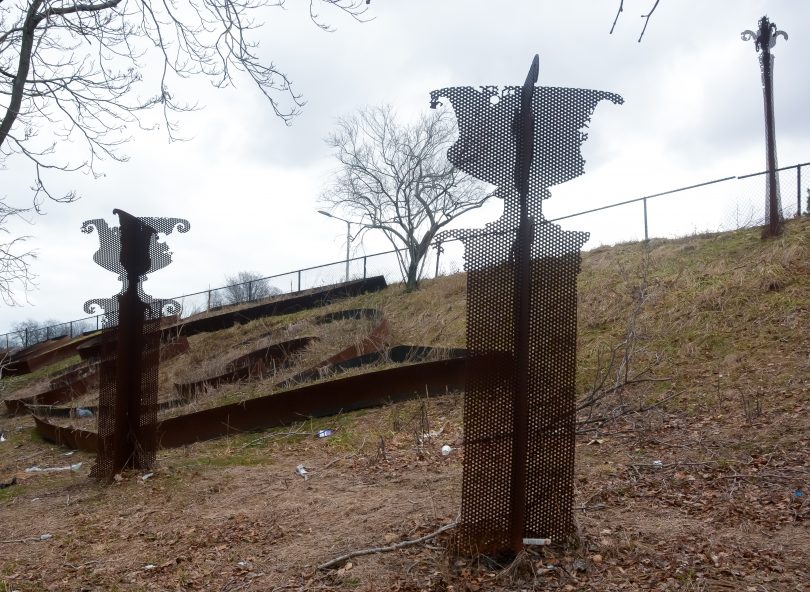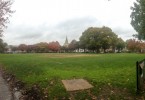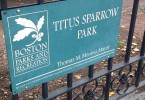By Miranda Suarez
BU News Service
BOSTON – The Lincoln Street Green Strip is not green.
Step off the downhill path connecting Cambridge Street and North Allston and the long brown grass crunches underfoot. Trash piles up: liquor bottles, plastic bags and an abandoned leather purse. The metal swirls of an art installation are long overgrown.
A Boston.com article from a decade ago about the then-upcoming art installation described the Green Strip much as it is today.
Richard Rogers of Allston is part of an organization that wants to clean it up. Friends of the Lincoln Street Green Strip received a $4,000 grant from the Harvard Allston Partnership Fund to put together a master plan and get community input, Rogers said. Rogers said it wouldn’t take a lot to help the area.
“Very little money would really improve that space,” Rogers said.
Friends of the Lincoln Street Green Strip originally applied for $20,000 to both plan a cleanup, which would focus on getting rid of invasive plant species, and put it into action Rogers said.
The organization is looking for extra funding from the Community Preservation Act. The CPA places a 1 percent surcharge on property taxes to fund projects in historic preservation, affordable housing and open space, which includes outdoor recreation.
The average Boston homeowner will pay $25 more a year, according to the slideshow Christine Poff, Boston’s community preservation director, presented at a community forum in South Boston on Feb. 22. Residents with low incomes are exempt. The presentation also said the state matches 10 percent of those taxpayer funds.
The city will get $20 million a year from taxpayers and the state match, Poff said.
The Allston Brighton Community Development Corporation might apply for CPA funding to rehab some of their affordable housing properties, wrote Dariela Maga, the organization’s housing project manager, in an email. The Allston Brighton CDC has developed hundreds of affordable housing units in the neighborhood, according to its website.
Aging buildings in the neighborhood could benefit from historic preservation money, said Brandon Bowser, former Allston-Brighton City Council candidate, after the CPA forum at the Harvard Ed Portal, a community center in North Allston.
“We should be putting money into bettering our communities and I think this is a really great first step,” Bowser said. “I mean, it’s $20 million. It’s not tons of money, but it’s something.”
The City of Boston’s Community Preservation Act page says the formal application for funding has not been released yet. Organizations could fill out a project interest form in the meantime up until April 6.
Both public and private organizations can apply, including the city itself, Poff said at the South Boston forum.
“Almost anybody can get this money,” Poff said.
Projects must be permanent, Poff said. A park paid for with CPA money must remain conservation land forever.
A nine-member Community Preservation Committee will review projects and give recommendations to the mayor and the City Council, who make the final decisions. At least 10 percent of the funding must go towards each project area and 5 percent goes to administrative costs. Besides that, there are no other restrictions, Poff said.
The Community Preservation Committee includes five mayor-appointed representatives from city boards, such as the Boston Planning & Development Agency, and four City Council-appointed residents with experience in business, housing or civic engagement.
Poff said she hopes to have two rounds of funding each year, with the first grants approved by July.
The law does not require that all neighborhoods get equal funding, Poff said.
“We know we’ll get flooded with downtown applications but we’re hoping to get out to neighborhoods much more,” she said.
Brandon Bowser said he thinks the city tends to neglect some neighborhoods.
“This should not replicate that same kind of system,” Bowser said.
The state legislature gave cities and towns the option to adopt the CPA in 2000. More than 170 Massachusetts cities and towns, including Boston, have approved it since, according to data from the Community Preservation Coalition. That’s almost half the cities and towns in the state.
Boston voters rejected a version of the CPA with a 2 percent tax surcharge in 2001, Poff’s slideshow said. When it reappeared as a ballot referendum in November 2016 with a 1 percent tax surcharge, the measure won with 74 percent of the vote.
The Community Preservation Coalition keeps a database of statewide projects funded with CPA money. The Morse School Playground in Cambridge received $260,000 for a renovation in 2015. Other projects include the restoration of a Nathaniel Hawthorne statue in Salem and a dune grass-planting project in Nahant.
Lisa Davidson, director of programs for the Somerville Homeless Coalition, which applies for CPA funds every year to pay for homelessness prevention programs such as affordable housing, said the funding helps save residents.
“Without that money, Somerville Homeless Coalition would have lost, approximately … eight to 10 apartments because we could not afford to rent them any longer,” Davidson said. “Those residents would have gone back into homelessness.”




